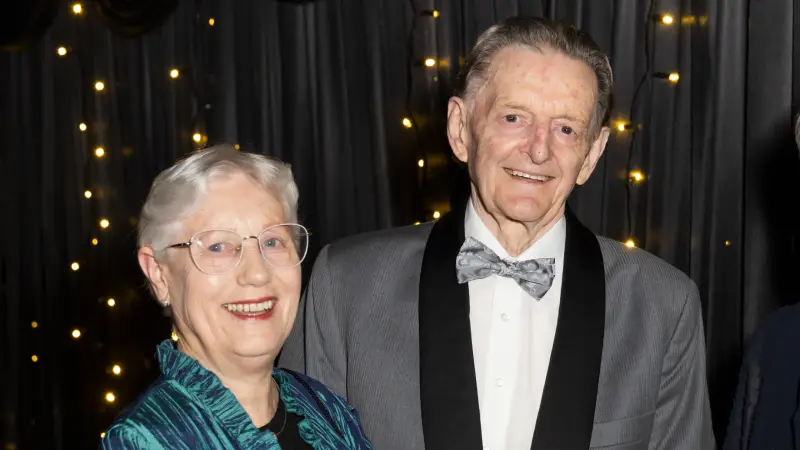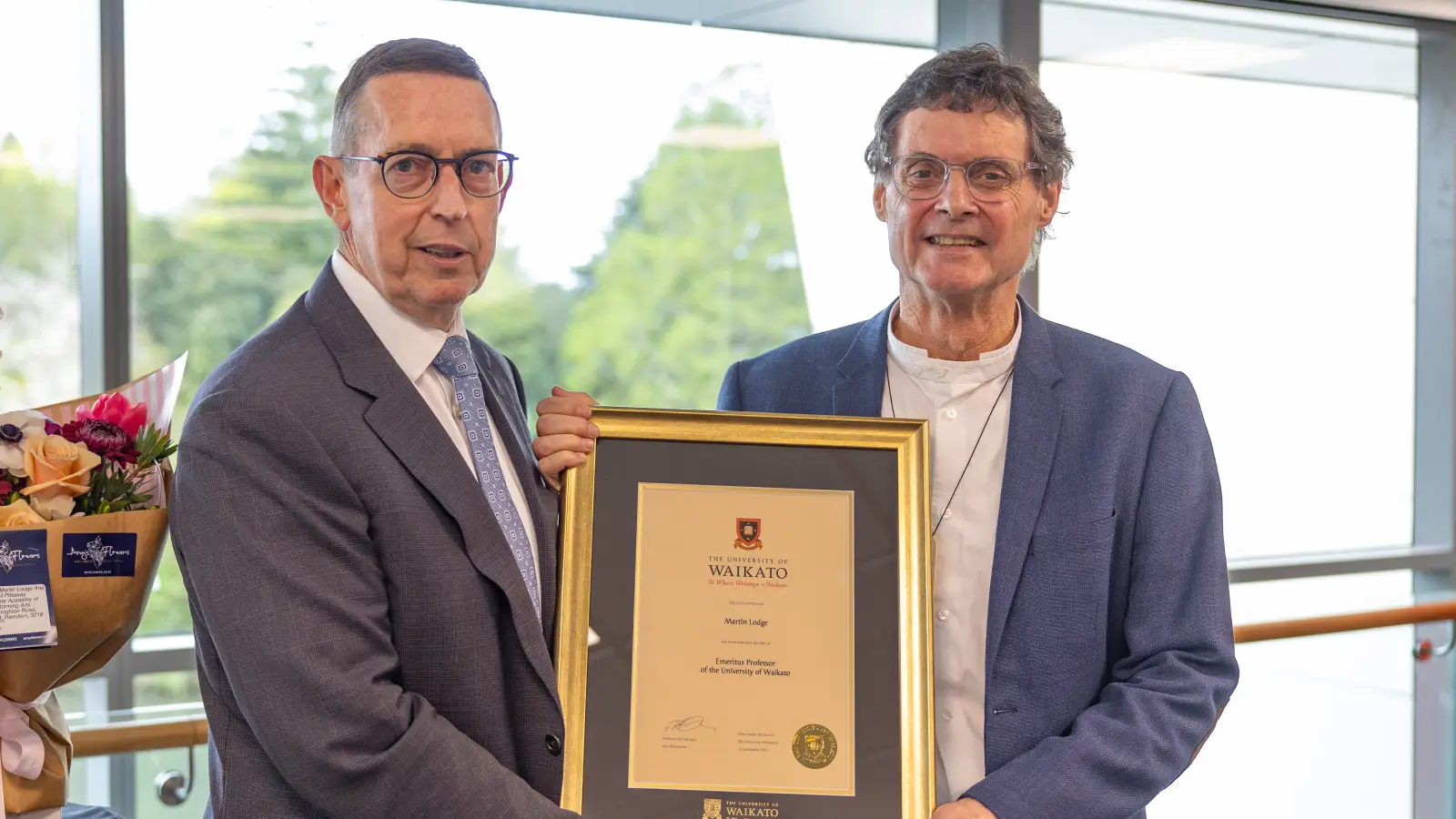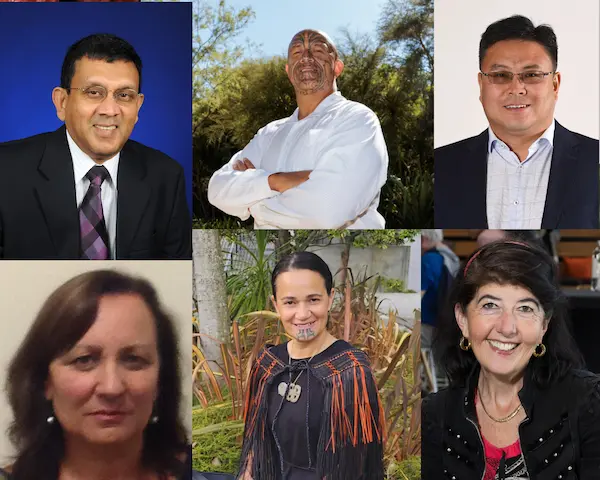The University of Waikato sponsors the short story competition and announced the winners at the annual Frank Sargeson Memorial Lecture, which was streamed online on Wednesday night due to Covid-19 lockdown restrictions.

Open Division first place winner Lara Markstein.
Lara Markstein’s story ‘Good Men’was the Open Division winner selected from 847 entries, and Shima Jack won the Secondary Schools Division with ‘Muscle Memory’, selected from 139 entries.
Markstein’s story is about the harshness of growing up in conservative, patriarchal communities.
Chief judge Patricia Grace says this story opens out, stage by stage, to form a picture of the main protagonist as part of an extended family, embracing three generations, in a particular time and place.
“Not an easy task within the confines of a short piece of writing,” says Grace, who is regarded as one of New Zealand’s best fiction writers. “Through action, reaction, interaction and vivid dialogue, characters and their circumstances are revealed.”
Markstein, from Picton, says she’d been thinking about this story after a family member revealed that their cousin wasn’t allowed to learn French.
“I find the idea of closing off knowledge to children heartbreaking, and often thought of this distant relation, until I felt compelled to write about it.
“So the story came relatively easily, by which I mean, it percolated unwritten for several years, and then I wrote (and rewrote) for several weeks.”
Markstein was born in South Africa, raised in Aotearoa, with a longer than intended interlude in the United States, where she graduated from Harvard University with a BA in English and received her MFA in Creative Writing from Warren Wilson College. Her work has appeared in a variety of literary journals and she’s currently completing an epistolary novel, titled Little Wonder.
She takes away $6000 for her prize-winning story, plus a publication fee, making the Sargeson Prize New Zealand’s richest short-story competition.
Second place and $1000 went to ‘The Duwende’ by Mikee Sto Domingo from Wellington and third place went to another Wellingtonian, Jordan Hamel, for his story ‘Unexpected item in the bagging area’.
 Secondary Schools Division first place winner Shima Jack.
Secondary Schools Division first place winner Shima Jack.
Secondary Schools Division winner Shima Jack is a Year 12 student at Dunedin’s Logan Park High School. Her winning story ‘Muscle Memory’ explores the intricacies of relationships and the quiet permanence of childhood memories.
Grace says of all the stories in the student section, Jack’s stood out as the one most clearly defined in regards to the short story genre.
“But it stood out in other ways too,” says Grace. “Sharply drawn images bring the reader into the story. From this beginning, it progresses via the thought processes of the narrator and through words spoken ... We learn of a grievance, and of a relationship somewhat on edge at this moment in time. Writing is spare, and appropriate to the mood it sets up.”
Jack says she wrote it in one intense period while listening to the song ‘Papillon’ by Johannes Motschmann, months after the idea first came to her in the form of the line ‘the slow blush of blood to skin’.
“That line sat in the Notes app on my phone for a while!” she says.
Jack has already published poetry and is the founder and editor of a writing anthology for her school where students can anonymously submit their writing to be featured in each edition.
“Towards the future, I’m focused on being more open-minded as a reader and writer and exploring different writing styles. Another ambition of mine is to start a youth writers’ group in my home city.”
Alongside $500 prize money, Jack wins a one-week summer writing residency at the University of Waikato, including accommodation, meals and mentoring.
Now in its third year, the Sargeson Prize was established in 2019 by novelist Catherine Chidgey, Senior Lecturer in Creative Writing at the University.
She says she was impressed with the extremely high quality of entries this year.
"There were enough fantastic stories to fill several anthologies and it was tough for the panel to narrow them down. Of particular note was the skill and range seen in the secondary schools entries."
This year’s winning stories will be published on ReadingRoom, Steve Braunias’ literary section of Newsroom.
He will publish ‘Good Men’ on 16 October, ‘Muscle Memory’ on 23 October, ‘The Duwende’ on 6 November and ‘Unexpected item in the bagging area’ on 13 November.
Results
Open Division:
- First: ‘Good Men’ by Lara Markstein, Picton
- Second: ‘The Duwende’ by Mikee Sto Domingo, Wellington
- Third: ‘Unexpected item in the bagging area’ by Jordan Hamel, Wellington
Highly Commended:
- ‘Close Your Eyes, Girls’ by Caoimhe McKeogh, Wellington
- ‘Inside the Ribcage’ by Marama Salsano, Hamilton
- ‘Precipitation’ by Harley Hern, Puhoi
- ‘Honeymoon in a Town Called Fog’ by Pip Robertson, Wellington
- ‘Mam’s Tables’ by Kirsty Gunn, Scotland
Secondary Schools Division:
- First: ‘Muscle Memory’ by Shima Jack, Logan Park High School, Dunedin
- Second: ‘What Makes a Forest’ by Jade Wilson, Kaiapoi High School
- Third: ‘Ghosts’ by Stella Weston, Rotorua Lakes High School
Highly Commended:
- ‘Blood Orange Season/The Girl Without a Heart’ by Zia Rogers, Feilding High School
- ‘Flowers from 1970’ by Ryan Davidson, Wairarapa College
- ‘Prelude’ by Ana Faville, Palmerston North Girls’ High School
- ‘Second Sight’ by Gemma Bennion, Hutt Valley High School
- ‘Ghosts’ by Andrew Crotty, Takapuna Grammar School
- ‘roll the bones’ by Cadence Chung, Wellington High School



